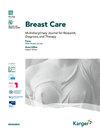在COVID-19大流行期间,65岁及以上诊断为乳腺癌的患者发生了什么变化:单中心体验
IF 2.1
4区 医学
Q2 OBSTETRICS & GYNECOLOGY
引用次数: 4
摘要
导言:COVID-19大流行对全球卫生保健系统产生了负面影响。本研究旨在确定年龄≥65岁的乳腺癌(BC)患者的诊断、临床病理特征和治疗方法在大流行期间如何受到影响。该调查显示,由于COVID-19传播风险、合并症导致的高死亡率和限制,患者,特别是老年人,不得不推迟BC健康问题或推迟常规控制。材料与方法:153例年龄≥65岁的BC患者(2019年1 - 12月;A组,n = 61)和期间(2020年3月- 2021年5月;B组(n = 92)回顾性分析COVID-19大流行病例。此外,我们还评估了患者的临床病理特征,包括年龄、入院形式、临床分期、肿瘤(T)大小分级、组织学亚型、淋巴结累及、手术类型和治疗方案。结果:以筛查为主要目的的患者被纳入A组,因已有BC或其他主诉而频繁申请诊断的患者被纳入B组(p = 0.009)。B组患者临床分期较高(p = 0.026), Ts一般较大(p = 0.020), Ts等级较高(p = 0.001),因此B组患者更常行乳房切除术和新辅助全身治疗(p = 0.041和p = 0.005)。结论:调查显示,在COVID-19大流行期间,诊断年龄≥65岁的患者的BC诊断和治疗方案发生了显著变化。延迟筛查和延迟治疗会导致老年患者出现更晚期的BC。本文章由计算机程序翻译,如有差异,请以英文原文为准。
What Has Changed in Patients Aged 65 and over Diagnosed with Breast Cancer during the COVID-19 Pandemic: A Single-Center Experience
Introduction: The COVID-19 pandemic has a worldwide negative impact on healthcare systems. This study aims to determine how the diagnosis, clinicopathological features, and treatment approaches of patients with breast cancer (BC) diagnosed at ≥65 years old were affected during the pandemic. This survey has shown that patients, especially the elderly, had to postpone their BC health problems or delay their routine controls due to the risk of COVID-19 transmission, high mortality rates due to comorbidity, and restrictions. Materials and Methods: The medical records of 153 patients with BC diagnosed at ≥65 years old before (January–December 2019; group A, n = 61) and during (March 2020–May 2021; group B, n = 92) the COVID-19 pandemic were retrospectively analyzed. In addition, clinicopathological features of patients, including age, admission form, clinical stage, tumor (T) size-grade-histology-subtype, lymph node involvement, surgery type, and treatment protocols, were evaluated. Results: Patients mostly applied for screening purposes were included in group A and patients who frequently applied for diagnostic purposes due to their existing BC or other complaints were included in group B (p = 0.009). Group B patients had a higher clinical stage (p = 0.026) and had commonly larger (p = 0.020) and high-grade (p = 0.001) Ts. Thus, mastectomy and neoadjuvant systemic therapy were more commonly performed in group B (p = 0.041 and p = 0.005). Conclusion: The survey showed significant changes in BC diagnosis and treatment protocols for patients diagnosed at ≥65 years old during the COVID-19 pandemic. Postponing screening and delaying treatment leads to more advanced BC stages in elderly patients.
求助全文
通过发布文献求助,成功后即可免费获取论文全文。
去求助
来源期刊

Breast Care
医学-妇产科学
CiteScore
4.40
自引率
4.80%
发文量
45
审稿时长
6-12 weeks
期刊介绍:
''Breast Care'' is a peer-reviewed scientific journal that covers all aspects of breast biology. Due to its interdisciplinary perspective, it encompasses articles on basic research, prevention, diagnosis, and treatment of malignant diseases of the breast. In addition to presenting current developments in clinical research, the scope of clinical practice is broadened by including articles on relevant legal, financial and economic issues.
 求助内容:
求助内容: 应助结果提醒方式:
应助结果提醒方式:


